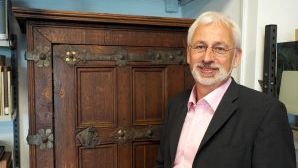An Espresso with… Prof. Dr. Konrad Elmshäuser, Director of the State Archive Bremen

Mr. Elmshäuser, when did you study at the University of Bremen, and why did you choose to study there?
I was here in the 80s. I moved to Bremen in 1981. In those days, many people very deliberately moved to Bremen. My family is from Marburg, though; I went to school in Wiesbaden – so moving far away was enticing. A friend of mine started studying music in Bremen, and so I went to Bremen, too. I had family there, so it seemed sensible to start in there. And, WHAT I wanted to study, I had known long before: History and German. That was it. While I didn’t want to pursue a classic teaching career, I could imagine a future in academia or journalism very well. Many students at that time almost cult-like went to Bremen (keyword ‘commie training center’) – although its peak seemed to have been reached before 1981. That led to a somewhat claustrophobic atmosphere at times. It seemed as if the reform university was being handled from the outside.
Which memories made a long-term impact on you – or rather: What memories remain from your personal experiences at the university?
Well – there’s no single incident that is especially present in my memories. But I just really liked to spend my time in GW2 then as well as the university library. We had great work conditions then, and still today – I have been teaching history as a visiting lecturer since 2009 – I enjoy the warm feeling of being on campus.
Do you remember who or what influenced your career the most?
I remember one lecturer in particular, a medievalist: Prof. Hägermann. We met early on. I highly regard his work focus: Germany and French history. He influenced me, and I eventually did my doctorate under his supervision. Unfortunately, he passed in 2006. For his 80th birthday, many of his former students gathered at the State Archive for a conference, and it was great to see how many careers he had helped form in social, economic, and technical history. Even in Paris (residence and doctorate at the German Historical Institute Paris), the École de Brême was deemed something then. It was something to be proud of. The turn from the reform model to a ‘real’ university took more than ten years in total and was very difficult. It sometimes also left behind some kind of helplessness.
What advice would you – in the dual function as a current lecturer and being mindful of your own studies – give to today’s students?
Yes (laughs), that’s true – I can’t really look at it and give advice with a distance of time. Nevertheless, I like to share that it is unwise to become dependent on questions of others. I’d like to suggest studying in a self-determined way, to take your studies into your own hands, and question all information. To use a critical method both in a scientific and a positive way. For historians this is mainly pertaining to source work. You can and you have to look at theories outside the box; check and question the sources; persevere. That’s a great research style. Don’t take everything as given and set in stone. (smiles) Study actively, so to speak.
And what does that entail for you?
Well, for example, it already starts with reading the newspaper attentively; maintaining a personal openness and fairness. As a visiting lecturer, I am actively involved with the source work on the state history of Bremen and Northwestern Germany. Not just the past history but very recently, the past ten years.
And your personal connection with the Alumni of the University of Bremen?
Oh, I hadn’t really noticed and discovered the association until this year. This only happened due to the the alumni’s tour [of the State Archive] and its preparations. We in Bremen are a comparatively young university and do not have a pronounced alumni culture yet like older German universities or universities abroad.
We have to ask our time travel question to you especially: Where would you go? Which time would you like to experience?
THAT is a no-brainer: to medieval Bremen! I am dying to know, are we correct with all our theories? Was life in those times really like we imagine? Or was it completely different? Are we in the dark? I would love to straighten out if the buildings are interpreted correctly, if the population figures are right, the people lived similarly… or was everything just dark and everyone afraid of the next winter? I have many more interesting questions on that matter!
Do or did you have a second, different passion in your life? Where you could say, had I not studied history, I would have…?
No – it all worked out wonderfully and just right for me. I did actually try something different: veterinary medicine! But the numerus clausus was too high – even higher than for medicine, can you imagine? And then there was a dreadful lottery system, which I did not want to rely on. After one or two application rounds, I withdrew. Now I have the feeling that I did everything right! And I only have positive memories of the university until this day. I’m well connected with it and, as a visiting lecturer, I have the chance to give something back, which is something that I profited from as well. I am thoroughly at ease with myself and happy. I have a friendly relationship with the University of Bremen.
That sounds like a wonderful closing statement – thank you very much for the interview!
(The interview was conducted by Manuela Brocksieper, con TEXT)

